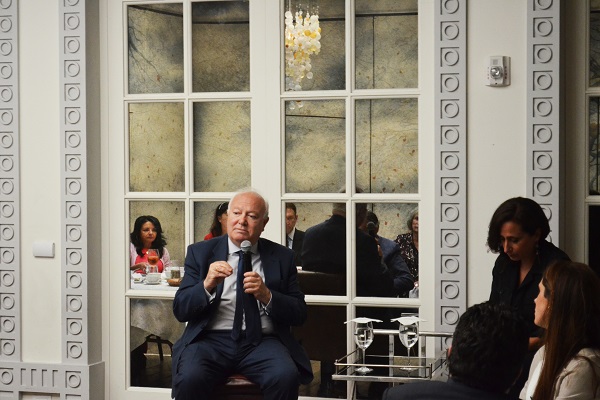 His Excellency Miguel Ángel Moratinos Cuyaubé discussing his role as UN High Commissioner for the Alliance of Civilizations at a roundtable lunch with Board and IC members
His Excellency Miguel Ángel Moratinos Cuyaubé discussing his role as UN High Commissioner for the Alliance of Civilizations at a roundtable lunch with Board and IC members
Attacks on places of worship from Sri Lanka to San Diego, paired with the global rise of nationalism and xenophobia have pointed to the complexities of life in the twenty-first century, especially between different cultures in an increasingly connected world.
In this complex and uncertain global environment, how do we establish an international environment that’s better for all of humanity? Speaking at a roundtable event at Spago Restaurant in Beverly Hills, UN High Representative of the Alliance of Civilizations (UNAOC), His Excellency Miguel Ángel Moratinos Cuyaubé, addressed Board and International Circle members on how his office works to find solutions to this pressing question.
Bridging cultural divisions is a deeply complex task, but the United Nations Alliance of Civilizations promotes intercultural dialogue, understanding, and cooperation. UNAOC specifically targets four areas: education, youth, media, and women. As the High Representative noted, it’s essential to teach children in school how to respect each another.
High Representative Moratinos’ work also includes protecting places of worship around the world. He stated that the right to worship is an essential human liberty—one that transcends cultural and linguistic divisions. As such, the High Representative is currently developing a plan to map all of the world’s religious groups. The map, he hopes, will convey how spirituality is essential to modern life. He wants to encourage the international community to protect and guarantee that people can safely and freely access their places of worship, whether it be a church, mosque, synagogue, etc. Through working with leaders and groups around the world, UNAOC aims to prevent religious violence and promote, as he called it in his mother tongue “convivencia,” a word derived from the period of time when Christians, Jews, and Muslims all lived together in relative harmony in modern-day Spain, the High Commissioner’s home country.
The discussion also touched on how cities and local leaders play a crucial role in influencing multicultural interactions. The High Representative remarked how cities are the formation of international relations: cities and local leaders are closer to their people and consequently may implement globally-minded policies better than federal governments. He also noted that if and when leaders send the wrong message to the public, we will not advance at all. High Representative Moratinos emphasized that we need to identify those who spread hate and condemn their messages.
A career diplomat for Spain, and formerly his country’s Foreign Minister, HE Moratinos has focused much of his career on building relationships and working towards peace in the Middle East and North Africa. Notably, he spent time engaged with the Arab-Israeli peace process representing Spain, the European Union, and the United Nations, and as such, has spent much of his career working to build understanding between cultures known for animosity towards one another.
The High Representative asserted that the twenty-first century will either be multicultural or not, and it is up to us to decide what kind of world we want to live in.
